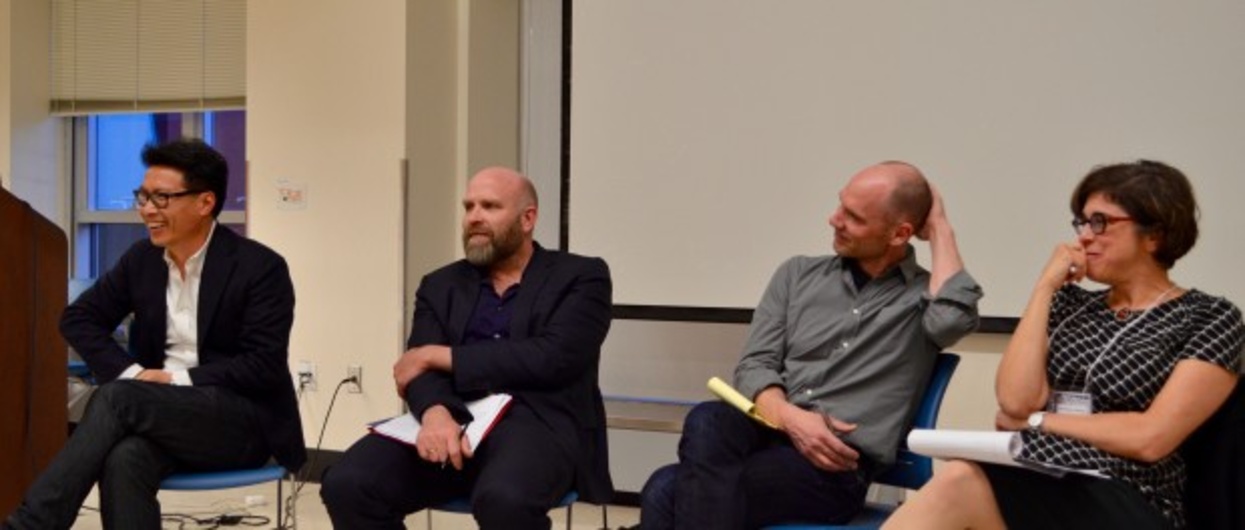Revisited: "Syncing... Subject, Media, Society"

Jessica Ruffin (German Studies) recaps this year's graduate student-led conference, Sycing... Subject Media, Society.
The 25th Annual Interdisciplinary German Studies Conference, Syncing… Subject, Media, Society – co-sponsored by BCNM and twelve other departments and institutions, and co-chaired by myself and Paul Hoehn, graduate students in the Department of German – took place Feb 24th and 25th, 2017. The conference featured presenters from across the country and the globe theorizing and exploring synchronism and synchronization on numerous temporal and material valences. I recap the conference and provide a couple takeaways below.
Over the two days, we heard from eleven emerging scholars on a variety of topics, including the body as a medium of self-surveillance; the function of “snapping to the grid” in music editing software; the rhythms and temporalities of the divine and predictive algorithm data flows; and the critical theoretical promise of Twitter and Instagram. Adhering to our commitment to thinking and working across disciplinary lines, the conference included two keynote addresses; Christoph Cox (Hampshire College) presented a paper entitled “Synaesthetics? Sound, Image and Materialism,” which called for a consideration of sound on an equal plane with image, arguing that such a turn in aesthetic practice and theory allows for an embodied and materialist experience of the transcendent. On day two, Helge Jordheim (University of Oslo) presented “The World In and Out of Sync: Looking Back at the Long 18th Century,” in which he asked us to consider how the method of producing synchronistic historical tables, laying out times of people and nations side by side on the same temporal axis, might counter-act or disrupt myopic narratives of national progress. Jordheim, along with four of his colleagues from the University of Oslo, also lead a morning workshop on François Hartog’s recent book Regimes of Historicity: Presentism and Experiences of Time (2015), asking workshop participants to consider what in our present medial environment might have led Hartog to declare it a moment of crisis, lacking past and future.
Something that has stuck with me over these last couple of weeks was proposed by Karen Feldman (Department of German) during the concluding roundtable discussion: “Perhaps there can be no theory of immediacy.” While criticality seems to demand stepping outside of systems of mediation, de-synchronizing oneself in order to bear witness, over the course of the conference, papers and discussions continually drew us to recognize that there is no outside. Critical theories and practices arise out of orienting towards media, through attuning to their unique temporalities and rhythms as material temporal objects, and ultimately colliding and remixing them. Though Hartog laments our Now as a moment of “presentism” and crisis propagated by a proliferation of mediations and the splintering of communities and societies into multiple temporal regimes, we may choose to recognize this proliferation as an opportunity to reconstitute the ever unfolding present. The challenges to such an approach became most clear in our many discussions about social media. We may critique social media from the outside, calling attention to its disorienting and deleterious effects on the social fabric, or we may choose to recognize that social media constitute their own societies and histories uniquely pregnant with potentialities for dérive and détournement. Our present (and any hope for the future) seems to demand such a turn towards, and into, media as both temporal and material.
Co-sponsored by the Department of German, the German Academic Exchange Service (DAAD), the Townsend Center for the Humanities, the Department of English, the Department of History, the Department of Film and Media, the History of Art Department, the Institute for European Studies, the Folklore Program, the Peder Sather Center for Advanced Study and Berkeley Center for New Media. <strong>In collaboration with</strong> the Program in Critical Theory and the Department of Theater, Dance and Performance Studies.
Full program information here.
